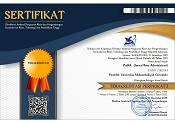Analysis of Challenges and Potential of the Village Economy Towards Competitive Village Development
Abstract
This article aims to analyze the challenges and potential of the village economy towards competitive village development. This topic is important and interesting, because with a well-managed village economy, related to it will create maximum village development later, because the village economy is the main foundation in relation to village development. The research method used is a qualitative method of data analysis, where the source and data are obtained through the results of data coding using Nvivo 12 Plus software. In this method, the researcher uses a qualitative approach to data analysis, where this method utilizes qualitative data and is described according to the analysis obtained. The data collection technique uses data analysis techniques through Nvivo 12 Plus software which is carried out by researchers to collect valid, complete, and relevant data related to the topic of the problem that is the object of research. The data analysis technique used analysis techniques based on data from Nvivo 12 Plus, where this technique was carried out by researchers to obtain the required data. The author finds that the government and the community must take part in making a positive impact on the progress of the village, because the challenges in developing the village are still often found whether it is from the bureaucracy that is still convoluted, the level of community participation is still minimal, funding is lacking, and so on. and so on, then the participation of the government and the community will certainly find efforts to overcome each of these problems.
Keywords
Full Text:
PDFReferences
Andhika, L. R. (2017). Systematic Review: Budaya Inovasi Aspek Yang Terlupakan dalam Inovasi Kepegawaian. Jurnal Kebijakan Dan Manajemen PNS, 11(1), 49–62. https://jurnal.bkn.go.id/index.php/asn/article/download/37/19
Ardiansah, M. N., Chariri, A., & Januarti, I. (2019). Empirical Study on Customer Perception of E-Commerce: Mediating Effect of Electronic Payment Security. Jurnal Dinamika Akuntansi, 11(2), 122–131. https://doi.org/https://doi.org/10.15294/jda.v11i2.20147
Block, D. (2017). Political Economy in Applied Linguistics Research. In Language Teaching, 50. https://doi.org/https://doi.org/10.1017/S0261444816000288
Cahyono, E. (2017). Era Disruption dan Manajemen Strategik Birokrasi. Sekretariat Kabinet Republik Indonesia. https://setkab.go.id/era-disruption-dan-manajemen-strategik-birokrasi/
Carrillo-Larco, R. M., & Castillo-Cara, M. (2020). Using Country-Level Variables to Classify Countries According to The Number of Confirmed COVID-19 Cases: An Unsupervised Machine Learning Approach. Wellcome Open Research, 1(8). https://doi.org/https://doi.org/10.12688/wellcomeopenres.15819.1
Hua, J., & Shaw, R. (2020). Corona Virus (COVID-19) “Infodemic” and Emerging Issues Through a Data Lens: The Case of China. International Journal of Environmental Research and Public Health, 17(7), 09–23. https://doi.org/https://doi.org/10.3390/ijerph17072309
Hussain, M. E., & Haque, M. (2016). “Foreign Direct Investment, Trade, and Economic Growth: An Empirical Analysis of Bangladesh.” Economies, 4(7). https://doi.org/doi : 10.3390/economies 4020007.
Ilegbinosa, I. A., Micheal, A., & Watson, S. I. (2015). “Domestic Investment and Economic Growth in Nigeria From 1970-2013: An Econometric Analysis.” Canadian Social Science, 11(6), 70-79. https://doi.org/DOI : 103968/7009.
Iskandar, J. (2016a). Manajemen Publik. Bandung: Puspaga.
Iskandar, J. (2016b). Membangun Kekuatan Masyarakat. Bandung: Puspaga.
Iswahyudi, H. (2016). Back to Oil: Indonesia Economic Growth After Asian Financial Crisis. Economic Journal of Emerging Markets, 8(1), 25–44. https://doi.org/https://doi.org/10.20885/ejem.vol8.iss1.art3
Iswahyudi, H. (2018). Do Tax Structures Affect Indonesia’s Economic Growth? Journal of Indonesian Economy and Business, 33(3), 216–242. https://doi.org/https://doi.org/10.22146/jieb.29033
Jufrida, F., Syechalad, M. N., & Nasir, M. (2016). “Analisis Pengaruh Investasi Langsung (FDI) dan Investasi dalam Negeri Terhadap Pertumbuhan Ekonomi Indonesia.” Jurnal Perspektif Ekonomi Darussalam, 2(1). https://doi.org/ISSN 2502-6976
Kickbusch, I., Leung, G. M., Bhutta, Z. A., Matsoso, M. P., Ihekweazu, C., & Abbasi, K. (2020). Covid-19: How a Virus is Turning The World Upside Down. Bmj, 13(36), 13–36. https://doi.org/https://doi.org/10.1136/bmj.m1336
Liu, W., Yue, X. G., & Tchounwou, P. B. (2020). Response to the COVID-19 Epidemic: The Chinese Experience and Implications for Other Countries. International Journal of Environmental Research and Public Health, 17(7), 2304. https://doi.org/https://doi.org/10.3390/ijerph17072304
Mubin, F., & Roziqin, A. (2018). Meritocracy of Bureaucracy in Indonesia. International Journal of Social Science and Humanity, 8(8), 241–246. https://doi.org/10.18178/ijssh.2018.V8.968
Murni, A. (2016). Ekonomi Makro, Edisi Revisi. Bandung: PT Refika Aditama.
Nurdin, N. H. (2019). Optimalisasi Pelayanan Publik dalam Perspektif New Public Service Pada Badan Pendapatan Daerah Kota Makassar. Jurnal Ilmiah Paranata Edu, 1(1), 01–13. https://doi.org/https://doi.org/10.36090/jipe.v1i1.188
Pepinsky, T. B., & Wihardja, M. M. (2011). No Title. Decentralization and Economic Performance in Indonesia., 11(3), 337–371. https://doi.org/https://doi.org/10.1017/S1598240800007372
Putra, B. K., Dewi, R. M., Fadilah, Y. H., & Roziqin, A. (2021). Reformasi Birokrasi Dalam Pelayanan Publik Melalui Mobile JKN di Kota Malang. Jurnal Ilmiah Publika, 9(1), 1–13. https://doi.org/http://dx.doi.org/10.33603/publika.v9i1.5325
Rukayat, Y. (2017). Kualitas Pelayanan Publik Bidang Administrasi Kependudukan di Kecamatan Pasirjambu. Jurnal Ilmiah Magister Ilmu Administrasi (JIMIA), 11(2), 56–65. https://jurnal.unnur.ac.id/index.php/jimia/article/view/32
Rusydiana, A. S., Laila, N., & Sudana, S. (2019). Efisiensi dan Produktivitas Industri Perbankan Pada Sistem Moneter Ganda di Indonesia. Jurnal Siasat Bisnis, 23(1), 50–66. https://doi.org/https://doi.org/10.20885/jsb.vol23.iss1.art5
Saidi, L., Adam, P., Saenong, Z., & Balaka, M. Y. (2017). The Effect of Stock Prices and Exchange Rates on Economic Growth in Indonesia. International Journal of Economics and Financial Issues, 7(3), 527–533.
Saputro, P. H., Budiyanto, A. D., & Santoso, A. J. (2015). Model Delone and Mclean untuk Mengukur Kesuksesan E-government Kota Pekalongan. Scientific Journal of Informatics, 2(1), 1–8. https://doi.org/https://doi.org/10.15294/sji.v2i1.4523
Spagnuolo, G., De Vito, D., Rengo, S., & Tatullo, M. (2020). COVID-19 Outbreak: An Overview on Dentistry. International Journal of Environmental Research and Public Health, 17(6), 36. https://doi.org/https://doi.org/10.3390/ijerph17062094
Sukirno, S. (2013). Makro Ekonomi Teori Pengantar, Edisi Ketiga. Jakarta: PT Raja Grafindo Persada.
Taufan, T. (2017). Implementasi Reformasi Birokrasi dan Kualitas Pelayanan Publik di Dinas Kependudukan dan Pencatatan Sipil Kabupaten Sleman Tahun 2014-2016. http://repository.umy.ac.id/bitstream/handle/123456789/11892/NaskahPublikasi.pdf?sequence=14&isAllowed=y
Wibowo, A., & Handika, R. F. (2017). The Strategy of The Banking Industry in Indonesia: Following Institutional Theory or Resource-Based View? Jurnal Siasat Bisnis, 21(2), 131-141. https://doi.org/https://doi.org/10.20885/jsb.vol21.iss2.art3
Wiratno, W. (2020). Implementasi Peningkatan Kualitas Pelayanan Publik Pemerintah Daerah Kabupaten Bone, Sulawesi Selatan. Jurnal Ilmu Hukum “Supremasi Hukum,” 16(2), 1–23. https://doi.org/https://doi.org/10.33592/jsh.v16i2.739
Article metrics
Refbacks
- There are currently no refbacks.
Copyright (c) 2022 Publik (Jurnal Ilmu Administrasi)

This work is licensed under a Creative Commons Attribution-ShareAlike 4.0 International License.

Publik (Jurnal Ilmu Administrasi) is licensed under a Creative Commons Attribution-ShareAlike 4.0 International License.










